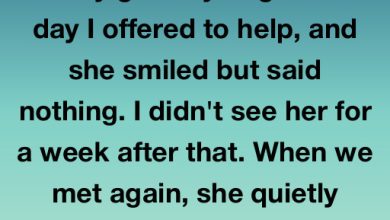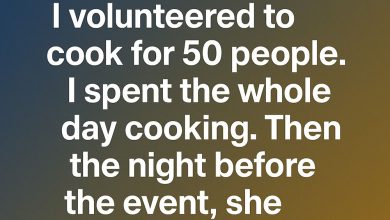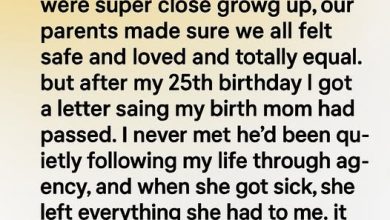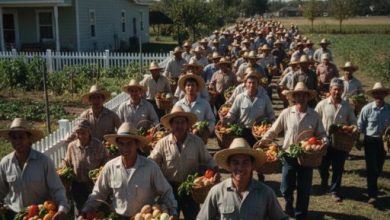Biker Bought Teenage Girl At Gas Station Human Trafficking Auction For $10,000
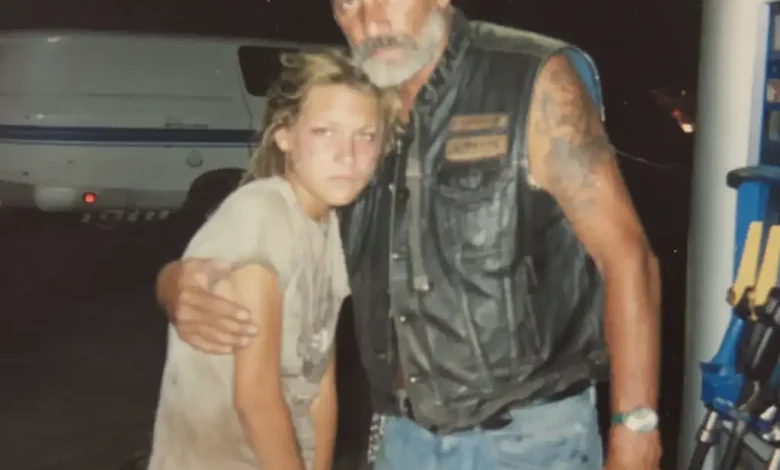
The biker overheard three men bidding on a teenage girl in the gas station bathroom at 3 AM like she was livestock.
I’d pulled off I-70 near Kansas City for gas and coffee. Dead tired from riding twelve hours straight. That’s when I heard them through the men’s room wall. Three voices arguing prices. Then a fourth voice. Young. Female. Terrified. Begging them to let her go.
“Fifteen hundred,” one man said. “She’s damaged goods. Tracks on her arms. Nobody wants a junkie.”
“Two grand,” another countered. “She’s young. Fourteen, maybe fifteen. Still profitable.”
I stood frozen by the sink. My blood turned to ice when I heard her whimper. “Please. My mom’s looking for me. She’ll pay. Just let me call her.”
They laughed. One slapped her. I heard it through the wall. Then the third man spoke, and his voice made my skin crawl. “Five thousand. Final offer. I’ll take her to Denver. Have her working by sunrise. She’ll make that back in a month.”
The door opened. They started leading her out. That’s when I saw her face. Bruised. Crying. Dead eyes. She looked right at me. Mouthed two words: “Help me.”
I had exactly seven seconds to make a choice that would either save this girl’s life or get us both killed. So I pulled out my wallet, stepped in front of them, and said six words that made everyone in that gas station freeze: “I’ll give you ten thousand cash. Right now.”
My name is William “Hammer” Davidson. Sixty-nine years old. Vietnam vet. Been riding Harleys for forty-four years.
I’ve seen evil. Combat. War crimes. Things that still wake me up at night fifty years later.
But nothing prepared me for what I heard through that bathroom wall at a gas station outside Kansas City at 3 AM.
Human trafficking. Right there. In the middle of America. At a truck stop like thousands of others.
I’d been riding alone. Coming back from my brother’s memorial in Colorado. Cancer took him at sixty-five. Too young. Too fast. I’d been on the road for twelve hours, running from grief, when I pulled into that gas station.
Just needed coffee. Bathroom. Ten minutes.
The men’s room was around the corner from the women’s. Shared a thin wall. That’s why I heard them so clearly.
“She’s not worth two grand. Look at her arms.”
I froze at the urinal. What were they talking about?
“She’s young. That’s what matters. Clean her up, she’ll pass for eighteen.”
“My buyer wants younger. Fourteen, fifteen tops.”
My hands started shaking. I knew what this was. Had heard about it. Read articles. Never thought I’d stumble into it.
“Please,” a girl’s voice. Young. Desperate. “Please let me go. I won’t tell anyone. I promise.”
A slap. Loud enough to hear clearly. The girl cried out.
“Shut up. You’re property now. Get used to it.”
I zipped up. Washed my hands slowly. Thinking. The bathroom had one exit. Right past me. They’d have to walk by.
My phone was in my vest. I could call 911. But what would I say? And how long would it take? These men would be gone in five minutes. The girl with them.
The door opened.
Three men walked out first. Mid-thirties to forties. Jeans. Baseball caps. Could’ve been anyone. Behind them, a teenage girl. Thin. Dirty clothes. Bruised face. Her hands were zip-tied in front of her.
She saw me. Made eye contact. Mouthed those two words: “Help me.”
One of the men noticed. “Keep walking.”
He shoved her toward the exit. They were heading to a white van in the parking lot. Windows tinted. No plates visible from where I stood.
I had seconds.
“Gentlemen,” I called out. “Got a minute?”
They turned. Looked at me. Six-foot-two biker covered in road dust and leather. One of them reached behind his back. Gun, probably.
“Not interested in whatever you’re selling, old man.”
“Funny. I was thinking the same thing.” I looked at the girl. “How much?”
Their expressions changed. Suspicion. But also interest.
“How much for what?”
“Don’t play stupid. I heard you through the wall. The bidding. How much for the girl?”
The girl’s eyes went wide. Betrayed. She thought I was another buyer. Another monster.
The men relaxed slightly. “Ten grand. Non-negotiable.”
I pulled out my wallet. Showed them the cash. I’d withdrawn fifteen thousand for my brother’s memorial. Burial costs. Hadn’t spent it all.
“I’ve got ten thousand right here. Cash. No questions.”
They looked at each other. Calculating. Was I a buyer? A cop? Something else?
“Why should we trust you?”
“Because I’m standing here with ten grand cash at 3 AM. Because I ride alone. Because I don’t look like a cop.” I paused. “And because that van’s got no plates. You’re running. Something went wrong. You need cash fast and you need to move faster.”
I was guessing. But their faces told me I was right.
“Where you taking her?”
“Denver,” one said. The others glared at him. He’d said too much.
“Fine. I’m heading to Reno. She works for me now. We done?”
They hesitated. Ten thousand cash right now versus the risk of driving to Denver with a girl who’d already tried to escape at least once based on the bruises.
“Let’s see the cash.”
I counted it out. Slowly. Making sure the girl saw. Making sure she understood I was buying time, not buying her. But she didn’t know that. She just stared at the money with dead eyes.
“Deal,” the leader said. He grabbed the cash. “She’s yours. But word of advice—keep her drugged. She’s a runner.”
They walked away. Got in the van. Drove off. I memorized what I could. White Ford Transit. 2018 or 2019. Dent on the left side. Broken taillight.
Then I turned to the girl.
She backed away. “Don’t touch me.”
“I’m not going to.”
“You just bought me.”
“No. I just got you away from them.” I pulled out my phone. “I’m calling 911.”
“No!” She lunged forward. Tried to grab my phone. “No police!”
“Why not?”
“Because they’ll send me back! To the group home! That’s where they took me from! That’s where this started!”
I lowered the phone. “Tell me what happened.”
Her name was Macy. Sixteen years old. Been in foster care since she was eight. Bounced between homes. Last one was a group home in Kansas City. Seventeen girls. Two adults supervising. One of those adults was selling the girls.
“Mrs. Patterson,” Macy said. Her voice was flat. Dead. “She’s been doing it for years. Takes the troublemakers. The ones nobody cares about. The runaways. Sells us to truckers. To men with vans. To whoever has cash.”
“The police—”
“Won’t believe me. I’m a foster kid with a drug problem. She’s a respected child care professional. Who do you think they’ll believe?”
She had a point. I’d seen it before. System protecting its own.
“The tracks on your arms,” I said. “They mentioned that.”
Macy pulled up her sleeves. Track marks. Fresh and old. “Mrs. Patterson got me hooked. Said it would make the work easier. Said I’d fight less.” Tears started falling. “I’ve been clean for three days. Since I ran. But they caught me at a truck stop in Topeka. Been passing me around since then.”
Three days. This sixteen-year-old had been trafficked for three days across multiple states and nobody had noticed.
“You said your mom’s looking for you.”
“I lied. My mom’s dead. OD’d when I was seven. That’s why I went into foster care.”
“Other family?”
“Nobody.”
Of course. That’s how they picked victims. No one to miss them.
I looked at this kid. Sixteen. Addicted. Trafficked. No family. No hope. The system had failed her at every turn.
“What’s your full name?”
“Macy Rodriguez.”
“Macy, I’m going to help you. But I need you to trust me. Can you do that?”
She laughed. Bitter. “Trust a biker who just paid ten grand for me? Why would I do that?”
“Because I’m about to cut those zip ties. Give you my phone. Let you call whoever you want. And if you want to run, I won’t stop you.”
I pulled out my knife. She flinched.
“I’m just cutting the ties.”
I cut them off. Handed her my phone. “Call whoever you trust most.”
She stared at it. “I don’t have anyone.”
“Then let me call someone who can help.”
I called Luther. My club’s lawyer. Woke him up at 3 AM.
“Luther, I need help. Human trafficking situation. Got a sixteen-year-old victim. Need safe placement. Need someone who can handle this properly.”
Luther was silent for ten seconds. Then: “Where are you?”
I told him.
“Don’t move. I’m making calls. Stay on the line.”
Thirty minutes later, two cars pulled up. A woman from a trafficking victim’s advocacy group. A social worker Luther trusted. Not connected to the Kansas City system.
Macy panicked when she saw them. “You said you’d help!”
“I am helping. These people specialize in this. They know what you’ve been through. They won’t send you back.”
The woman from the advocacy group approached slowly. “Macy? My name is Jennifer. I run a safe house for trafficking victims. No police. No foster system. Just safety. Medical care. Whatever you need.”
“Why should I believe you?”
Jennifer rolled up her own sleeve. Track marks. Faded but visible. “Because fifteen years ago, I was you. And someone helped me. Now I help others.”
Macy broke. Sobbed. Jennifer held her while she fell apart.
The social worker pulled me aside. “You did the right thing. But you know you just committed a felony, right? You participated in a human trafficking transaction.”
“Yeah.”
“The police will have questions.”
“Let them ask.”
I gave my statement. Described the men. The van. Everything I could remember. Handed over my dashcam footage. My bike had a camera that captured the van leaving. Partial VIN visible in one frame.
“This is good,” the detective said. “Really good. We’ve been tracking a trafficking ring through truck stops for six months. Your information might crack it open.”
“What about Macy?”
“She’s safe. The advocacy group is solid. She won’t go back into state care.”
“And Mrs. Patterson?”
The detective smiled. “We’ll be having a conversation with her very soon.”
I went to visit Macy three days later. The safe house was outside the city. Secure. Anonymous. Six other girls there. All trafficking victims.
Macy was in withdrawal. Shaking. Sick. But alive.
“Why’d you help me?” she asked.
“Because you asked me to.”
“That’s it?”
“That’s everything.”
She thought about that. “The other men who saw me that night. At different truck stops. They didn’t help. They looked away. Or they—” She stopped. Couldn’t say it.
“I know.”
“Why didn’t you look away?”
I thought about Vietnam. About villages burning. About knowing something was wrong and having to choose. Look away or act.
“Because I’ve looked away before. Long time ago. Different situation. It’s haunted me for fifty years. I wasn’t looking away again.”
Macy’s recovery took months. Detox. Therapy. Learning to trust. Learning to hope.
The police arrested Mrs. Patterson and two other staff members at the group home. Seventeen girls testified. Seventeen girls who’d been sold. Some for years.
The trafficking ring? Five men arrested. Including the three from the gas station. My dashcam footage helped identify them. They’re all serving twenty-plus years.
Macy turned seventeen in the safe house. Then eighteen. Graduated high school through a special program. Started community college.
I visited once a month. Brought her books. Helped with homework when she asked. Taught her about motorcycles because she was curious.
“Why bikes?” she asked one day.
“Freedom. You’re in control. You decide where to go. Nobody owns you.”
She understood that metaphor. “Can you teach me to ride?”
“When you’re ready.”
On her nineteenth birthday, Macy called me. “I’m ready.”
I taught her on a small Honda. She was terrified at first. Then determined. Then joyful.
“I’m flying,” she said after her first solo ride. “I’m actually flying.”
She got her license. Bought her own bike with money from her part-time job. Started riding to campus. To therapy. To the safe house where she now volunteered, helping other girls like her.
“I’m going to be a social worker,” she told me. “The right kind. The kind who actually protects kids.”
“You’ll be good at it.”
“Because I know what it’s like to need saving and have everyone look away?”
“Because you know what it’s like to be saved by someone who didn’t look away.”
Macy’s twenty-three now. Graduated with her social work degree. Works with trafficking victims. Testifies at trials. Helps prosecution cases.
She still rides. Has her own Harley now. Sportster. Purple. Covered in stickers about trafficking awareness.
We ride together sometimes. Her and me and a few other club members. Sometimes other survivors join us. Women who’ve escaped. Who’ve healed. Who ride to remember they’re free.
Last month, we organized a ride. “Macy’s Run for Freedom.” Two hundred bikers. Raised fifty thousand dollars for trafficking victim services.
At the end, Macy gave a speech.
“Seven years ago, I was being sold in a gas station bathroom. Three men were bidding on me like I was property. I’d given up. Accepted that this was my life now. That I’d die young in some hotel room somewhere and nobody would care.”
She looked at me.
“Then a biker overheard. He could have ignored it. Could have walked away. Could have called police and let them handle it. Instead, he stepped in. Put himself at risk. Bought me from those men so he could set me free.”
“People ask me why I trust bikers. Why I ride with them. Why I call them family. It’s because when everyone else—the system, the police, regular people at truck stops—when everyone else looked away, a biker didn’t.”
“He saw a sixteen-year-old girl mouthing ‘help me’ and he helped.”
The crowd was crying. Two hundred bikers. All crying.
“So when people tell me bikers are dangerous, I tell them they’re right. Bikers are dangerous. Dangerous to traffickers. Dangerous to abusers. Dangerous to anyone who hurts the innocent.”
“Because bikers don’t look away.”
She’s right. We don’t.
That night changed me. Made me pay more attention. Made our whole club pay attention.
We started training. Learning signs of trafficking. How to spot victims. Who to call. What to do.
We’ve helped four more girls since Macy. Four more times we noticed something wrong and acted instead of looking away.
Each one is alive. Free. Healing.
Because a biker paid attention.
The ten thousand dollars? I never asked for it back. Used it to help Macy. First month’s rent. Security deposit. Books. Whatever she needed.
“I’ll pay you back,” she said.
“You already did. By surviving. By healing. By helping others.”
Macy has a photo in her apartment. Me standing next to my bike outside that gas station. She took it years later when we went back.
“Why’d you want to go back?” I asked.
“To remember. This is where I died and got reborn. Where someone saw me as human instead of property. Where a biker with ten thousand cash chose to save me instead of use me.”
The caption under the photo reads: “My hero. My savior. My dad.”
That last word gets me every time.
I never had kids. Couldn’t. Medical issue. It haunted my marriage. Part of why my wife and I never fully connected. Part of why I rode so much. Running from that emptiness.
Then a sixteen-year-old mouthed “help me” in a gas station at 3 AM.
And I became a father.
Not through blood. Through choice. Through showing up in a moment when it mattered most.
Macy Rodriguez is my daughter now. In every way that counts. She calls me Dad. I call her my kid. We’re family.
And it started because I was too tired to ignore evil.
Because I heard trafficking happening through a bathroom wall and I refused to look away.
Because sometimes the most important thing you can do is stop at a gas station at exactly the right moment.
And pay attention.
Macy starts her master’s program next fall. Specialized trafficking victim advocacy. She’s going to change the system that failed her.
“I’m going to make sure no other girl is sold by the person meant to protect her,” she says.
She will. I believe that.
Because Macy Rodriguez survived hell. Escaped. Healed. And now she’s becoming the person she needed seven years ago.
The person who doesn’t look away.
The person who acts.
The person who saves.
Just like a biker at a gas station taught her.
